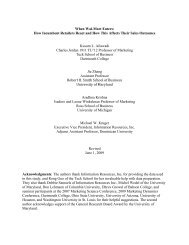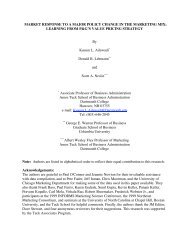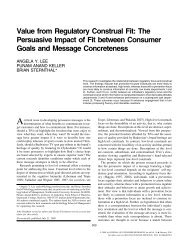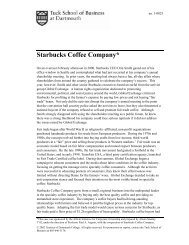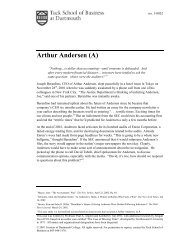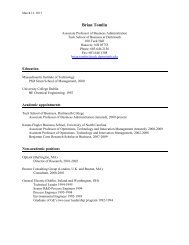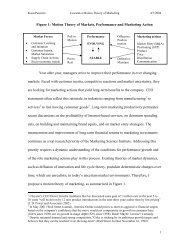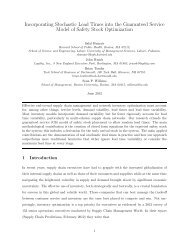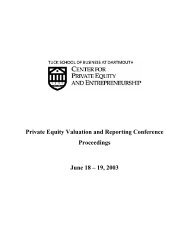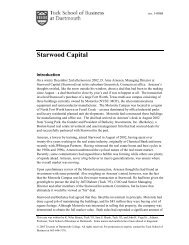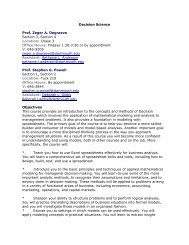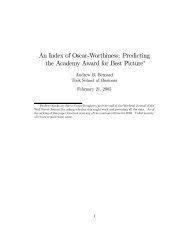tax notes international - Tuck School of Business - Dartmouth College
tax notes international - Tuck School of Business - Dartmouth College
tax notes international - Tuck School of Business - Dartmouth College
Create successful ePaper yourself
Turn your PDF publications into a flip-book with our unique Google optimized e-Paper software.
Table 2. Comparison <strong>of</strong> OECD Model Convention and India-Singapore Treaty<br />
OECD Model Convention Agreement Between the Government <strong>of</strong> the Republic <strong>of</strong> Singapore<br />
and the Government <strong>of</strong> the Republic <strong>of</strong> India for the Avoidance <strong>of</strong><br />
Double Taxation and the Prevention <strong>of</strong> Fiscal Evasion with respect<br />
to Taxes on Income concluded January 24, 1994<br />
Article 5—Permanent Establishment Article 5—Permanent Establishment<br />
1. For the purposes <strong>of</strong> this Convention, the term ‘‘permanent<br />
establishment’’ means a fixed place <strong>of</strong> business through which the<br />
business <strong>of</strong> an enterprise is wholly or partly carried on.<br />
2. The term ‘‘permanent establishment’’ includes especially:<br />
a) a place <strong>of</strong> management;<br />
b) a branch;<br />
c) an <strong>of</strong>fice;<br />
d) a factory;<br />
e) a workshop, and<br />
f) a mine, an oil or gas well, a quarry or any other place <strong>of</strong><br />
extraction <strong>of</strong> natural resources.<br />
(...)<br />
5. Notwithstanding the provisions <strong>of</strong> paragraphs 1 and 2, where a<br />
person — other than an agent <strong>of</strong> an independent status to whom<br />
paragraph 6 applies — is acting on behalf <strong>of</strong> an enterprise and has,<br />
and habitually exercises, in a Contracting State an authority to<br />
conclude contracts in the name <strong>of</strong> the enterprise, that enterprise shall<br />
be deemed to have a permanent establishment in that State in respect<br />
<strong>of</strong> any activities which that person undertakes for the enterprise,<br />
unless the activities <strong>of</strong> such person are limited to those mentioned in<br />
paragraph 4 which, if exercised through a fixed place <strong>of</strong> business,<br />
would not make this fixed place <strong>of</strong> business a permanent<br />
establishment under the provisions <strong>of</strong> that paragraph.<br />
To support its arguments, Indian <strong>tax</strong> authorities relied<br />
mainly on the OECD ‘‘Report on the Attribution<br />
<strong>of</strong> Pr<strong>of</strong>its to Permanent Establishments.’’ SET Satellite<br />
argued that, according to the provisions <strong>of</strong> article 7(2)<br />
<strong>of</strong> the India-Singapore treaty, since SET India was remunerated<br />
on an arm’s-length basis there was no additional<br />
pr<strong>of</strong>it to be <strong>tax</strong>ed in India regarding the advertisement<br />
revenues. The arguments raised by SET<br />
Satellite were supported by the writings <strong>of</strong> Philip Baker<br />
and Richard S. Collier, guidance previously issued by<br />
the Indian <strong>tax</strong> authorities, and the decision <strong>of</strong> the<br />
AAR in Morgan Stanley, in which an arm’s-length reward<br />
paid by a foreign enterprise to its dependent<br />
SPECIAL REPORTS<br />
1. For the purposes <strong>of</strong> this Agreement, the term ‘‘permanent<br />
establishment’’ means a fixed place <strong>of</strong> business through which the<br />
business <strong>of</strong> the enterprise is wholly or partly carried on.<br />
2. The term ‘‘permanent establishment’’ includes especially:<br />
(a) a place <strong>of</strong> management;<br />
(b) a branch;<br />
(c) an <strong>of</strong>fice;<br />
(d) a factory;<br />
(e) a workshop;<br />
(f) a mine, an oil or gas well, a quarry or any other place <strong>of</strong><br />
extraction <strong>of</strong> natural resources;<br />
(g) a warehouse in relation to a person providing storage facilities<br />
for others;<br />
(h) a farm, plantation or other place where agriculture, forestry,<br />
plantation or related activities are carried on;<br />
(i) premises used as a sales outlet or for soliciting and receiving<br />
orders;<br />
(j) an installation or structure used for the exploration or<br />
exploitation <strong>of</strong> natural resources but only if so used for a period<br />
<strong>of</strong> more than 120 days in any fiscal year.<br />
(...)<br />
8. Notwithstanding the provisions <strong>of</strong> paragraphs 1 and 2, where a<br />
person — other than an agent <strong>of</strong> an independent status to whom<br />
paragraph 9 applies — is acting in a Contracting State on behalf <strong>of</strong><br />
an enterprise <strong>of</strong> the other Contracting State that enterprise shall be<br />
deemed to have a permanent establishment in the first-mentioned<br />
State, if:<br />
(a) he has and habitually exercises in that State an authority to<br />
conclude contracts on behalf <strong>of</strong> the enterprise, unless his activities<br />
are limited to the purchase <strong>of</strong> goods or merchandise for the<br />
enterprise;<br />
(b) he has no such authority, but habitually maintains in the<br />
first-mentioned State a stock <strong>of</strong> goods or merchandise from which<br />
he regularly delivers goods or merchandise on behalf <strong>of</strong> the<br />
enterprise; or<br />
(c) he habitually secures orders in the first-mentioned State, wholly<br />
or almost wholly for the enterprise itself or for the enterprise and<br />
other enterprises controlling, controlled by, or subject to the same<br />
common control, as that enterprise.<br />
agent for the service provided extinguishes the <strong>tax</strong><br />
liability <strong>of</strong> the foreign enterprise in India.<br />
The court clearly adopted an interpretation in line<br />
with the authorized OECD approach or dual <strong>tax</strong>payer<br />
approach by treating the dependent agent and the<br />
agency PE as two different <strong>tax</strong>able units:<br />
A dependent agent cannot, strictly speaking, be<br />
termed as PE because neither the Dependent<br />
Agent belongs to the PE, nor can one have something<br />
as a result <strong>of</strong> having the same thing, i.e. if<br />
a dependent agent is itself a PE, one cannot have<br />
a PE as a result <strong>of</strong> having a dependent agent. In<br />
TAX NOTES INTERNATIONAL FEBRUARY 2, 2009 • 439<br />
(C) Tax Analysts 2009. All rights reserved. Tax Analysts does not claim copyright in any public domain or third party content.



